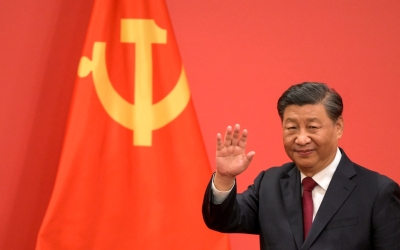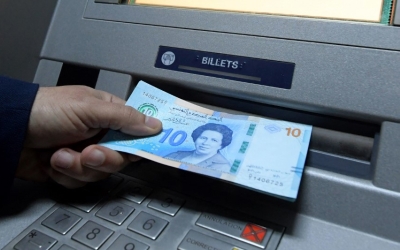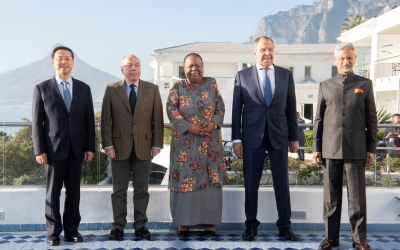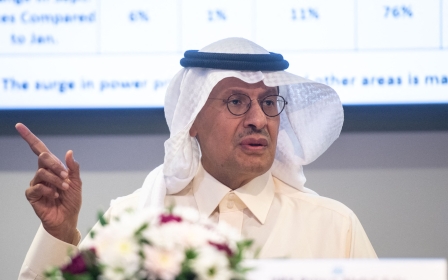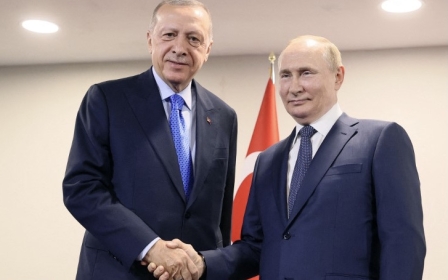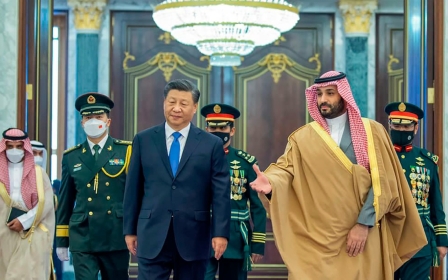Why Arab countries are queuing up to join Brics
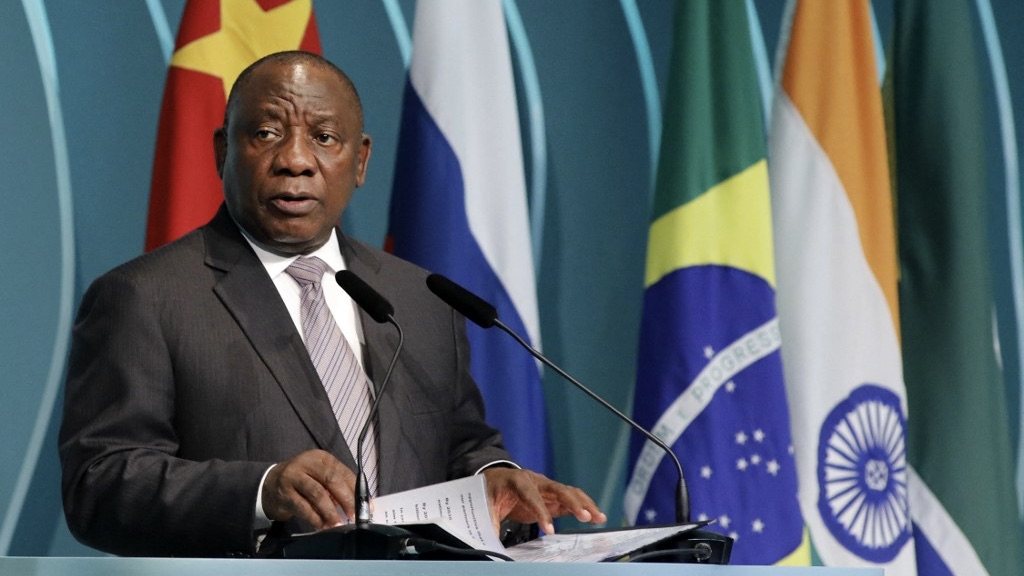
Coined in 2001 by the British economist Jim O'Neill for the four emerging markets of Brazil, Russia, India and China, the acronym Bric became Brics in 2011 after South Africa was invited to join the group.
Since then, the Brics alliance has been the subject of much debate. And with the five nations set to meet in Johannesburg between 22-24 August, the debate is set to continue.
The Brics group of rapidly growing markets was initially devised as an opportunity for the G8 countries (G7 since the exclusion of Russia in 2014 after its invasion of Crimea) to seek lucrative investment opportunities - and not as a rival strategic alliance.
The group has nonetheless become increasingly political in recent years, particularly with escalating rivalries between the United States and China and the western-imposed sanctions against Moscow following Russia’s annexation of Crimea and subsequent invasion of Ukraine.
The Brics today claim to be a balancing force in the transition to a new, and increasingly multilateral, economic world order - one that could arguably dent the dominance of the US dollar in global trade.
New MEE newsletter: Jerusalem Dispatch
Sign up to get the latest insights and analysis on Israel-Palestine, alongside Turkey Unpacked and other MEE newsletters
The argument is particularly appealing to developing countries and nations seeking greater strategic autonomy, even more so with the Brics having recently overtaken the G7 in terms of global GDP share and with discussions for potential future member states under way.
More than 15 countries have expressed an interest in joining the Brics bloc. The potential candidates include Argentina, Mexico, Turkey, Senegal, Iran and Indonesia, as well as Algeria, Saudi Arabia, Bahrain, Egypt, the United Arab Emirates and Tunisia.
Morocco too had quietly put in a bid, South Africa’s top diplomat on Brics claimed in early August, which was later angrily denied by Rabat.
The once indisputably US-aligned Gulf monarchies, though still heavily dependent on US security guarantees, are now seeking greater strategic autonomy from Washington.
Notable examples include the recent reestablishment of diplomatic relations between Saudi Arabia and Iran in a deal brokered by China, and the Arab League’s decision to reinstate Syria, thanks mostly to a Saudi-UAE-sponsored initiative. This was despite the refusal of western leaders to deal with Bashar al-Assad, openly aligned with Moscow in the conflict in Ukraine.
Shaking up traditional alliances
Clearly, the Gulf states today are committed to maintaining good relations with their immediate neighbours, even if it means shaking up traditional alliances.
Reducing the region’s dependence on oil revenue is another critical challenge, particularly for Saudi Arabia, which is moving towards greater independence from oil, backed by American and increasingly Chinese investment.
Numerous megaprojects have emerged in the kingdom as part of an ambitious economic transformation plan to increase diversification and attract foreign investors.
It must also be noted that Joe Biden’s administration has taken a less accommodating stance towards Saudia Arabia. The US president called for a review of Saudi-American relations after the kingdom and Opec+ agreed to cut oil production in October 2022, with gas prices subsequently soaring in Europe.
Biden had earlier made a point of taking Crown Prince Mohammed bin Salman to task over human rights issues, which hardly sat well with the Saudis.
Thus, Saudi Arabia, the UAE, Bahrain and Egypt - whose government maintains close ties with Riyadh and Abu Dhabi - are all hoping to capitalise on the power vacuum created by the Russia-Ukraine conflict, to break rank with their historic allies and expand their influence on the rapidly changing global stage.
The shifting power dynamics have also affected Morocco, as the kingdom attempts to maintain its ties with Europe and the US, while entering strategic trade partnerships with countries such as China, Brazil and India.
And what could be more natural than to heed the call of a multipolar world led by the major Brics economies? The Brics New Development Bank (NDB), headquartered in Shanghai, China - which regards itself as an alternative to the World Bank and the International Monetary Fund (IMF) - thus admitted the UAE in September 2021 and, more recently, Egypt, in March 2023.
Algeria applies
And now it is Saudi Arabia’s turn. The kingdom has expressed an interest in applying for a loan and joining the NDB in the not-too-distant future.
At the last meeting of the Brics foreign ministers, Saudi Arabian diplomat Faisal bin Farhan al-Saud pointed out that the kingdom was the Brics bloc’s largest Middle Eastern trading partner, with trade with the Brics countries increasing from $81bn in 2017 to $128bn in 2021. Last year, the figure leapt to over $160bn.
In August 2022, Algerian President Abdelmadjid Tebboune expressed a desire for his country to join Brics. Algeria’s bid for membership was officially endorsed by Russia and China.
Algiers sees Brics as the reincarnation of the non-aligned movement, for which it was the standard-bearer in the movement's heyday
The Algerian president argued that joining the Brics "economic and political powerhouse", would distance Algeria, considered a "pioneer of the non-aligned movement", from "the attraction of the two poles".
Algeria officially applied for membership last month.
Unlike the Gulf monarchy bids, Algeria’s request for membership is more political than economic. With the international landscape having considerably evolved, and the concept of the "third world" giving way to that of the "global south", Algiers sees the group of emerging powers as the reincarnation of the non-aligned movement, for which it was a standard-bearer in the movement’s heyday.
In April 1974, Algeria's President Houari Boumediene took to the floor of the United Nations to demand the creation of a new international economic order.
Algeria was also a founding member of G15 - an informal group set up in Belgrade in 1989 to counter the influence of the G7 - which would fade from the international scene in the noughties.
Algeria’s ambitions of reforming the international system have always been part of its diplomatic DNA.
But with the current government making efforts to return to the principles that enhanced the country’s past influence, and the Brics nations aiming to assert themselves on the global and political stage, Algeria's bid comes at a particularly opportune time.
Tunisia bid
However, for now at least, the Brics alliance is still mainly defined by economic standards, and despite Tebboune’s pledge to speed up economic reforms, Algiers will be hard pushed to meet them.
Algeria’s lack of economic diversity and relatively low levels of trade with Brics member states (China aside) could see its bid put on the back burner, to the advantage of the Gulf monarchies, and even Egypt, which represents a market of 109 million people.
Algiers will, however, have major cards to play by promoting its new investment code, which aims to be less restrictive vis-a-vis foreign investors, and infrastructure such as the trans-Saharan highway and the $3.3bn deep-water port at El Hamdania (west of Algiers), which will be a key gateway to Africa when completed.
In spring, Tunisia also expressed an interest in joining the Brics, though it has yet to make a formal application. The request is nonetheless surprising.
Tunisia has been mired for years in a deep economic crisis that has worsened since 2021. The country’s national debt last year reached 80 percent of its GDP, and the Tunisian government is facing a serious financial crisis.
Financial support from partners, and Algeria in particular, which has approved several aid packages, has been insufficient, and Tunis has no choice today but to turn to international financial institutions.
But the country’s president, Kais Saied, inspired by a populist concept of sovereignty, is reluctant to accept the conditions and budget reforms imposed by traditional lenders, notably the IMF.
On 14 June, during a visit to the town of Gafsa, the Tunisian president was quoted as saying "in the holy Quran there is not a single sura called 'International Monetary Fund'," so his country "will not bow to anyone but Allah".
Calculated ploy
However, Tunisia’s traditional western allies are hardly inclined to offer unconditional support, considering the president’s constitutional coup in the summer of 2021, which they considered a serious attack on the country’s democratic gains.
And while a financial agreement on immigration was reached last month, making Tunis the de facto gendarme of the Mediterranean in exchange for EU aid, the amount was woefully inadequate given the scale of the crisis.
The Tunisian government, therefore, seems determined to seek help from alternative organisations, including the Brics and its NDB. However, the bank’s stated purpose is to mobilise resources for member country projects - not to shore up failing governments.
Saied’s conspicuous attempt to join the Brics appears to be a calculated ploy aimed at intimidating Tunisia's allies in the West who are loath to see the country exit their sphere of influence.
The Brics nations, however, see the country’s approach in a favourable light - China has already expressed its approval. That said, Tunisia better not hold its breath, given the organisation’s focus on strategic influence and strong relations with existing Brics members.
The various bids may be motivated by different factors, but each reflects the Arab countries’ ambitions to become fully fledged actors in the global arena - instead of watching from the sidelines.
Now it’s up to the Brics to come to an agreement on the political and economic criteria for admitting new members.
The views expressed in this article belong to the author and do not necessarily reflect the editorial policy of Middle East Eye.
This piece has been translated from the MEE French edition.
Middle East Eye delivers independent and unrivalled coverage and analysis of the Middle East, North Africa and beyond. To learn more about republishing this content and the associated fees, please fill out this form. More about MEE can be found here.



